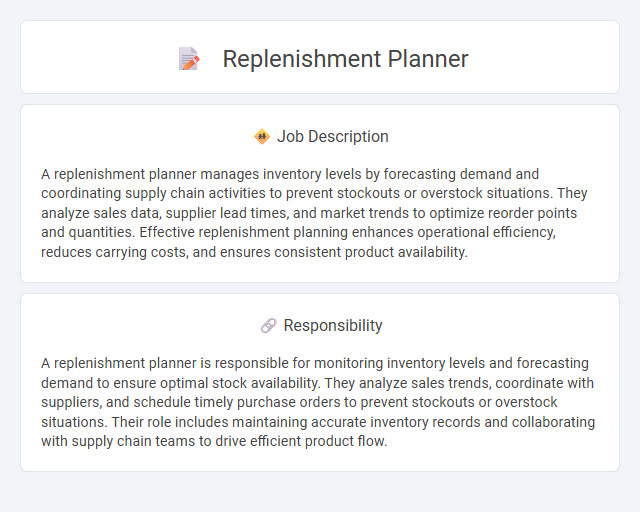
A replenishment planner manages inventory levels by forecasting demand and coordinating supply chain activities to prevent stockouts or overstock situations. They analyze sales data, supplier lead times, and market trends to optimize reorder points and quantities. Effective replenishment planning enhances operational efficiency, reduces carrying costs, and ensures consistent product availability.
Individuals with strong analytical skills and a detail-oriented mindset are likely to excel as replenishment planners due to the role's focus on inventory management and demand forecasting. Those who thrive in structured environments and enjoy problem-solving under pressure may find this job particularly suitable. Conversely, people who prefer unstructured tasks or struggle with multitasking might face challenges in this position.
Qualification
Replenishment planners require strong analytical skills and expertise in inventory management software such as SAP or Oracle ERP. Certification in supply chain management, like APICS CPIM or CSCP, enhances qualification and career prospects. Experience in demand forecasting and procurement processes is essential for accurate inventory replenishment and minimizing stockouts.
Responsibility
A replenishment planner is responsible for monitoring inventory levels and forecasting demand to ensure optimal stock availability. They analyze sales trends, coordinate with suppliers, and schedule timely purchase orders to prevent stockouts or overstock situations. Their role includes maintaining accurate inventory records and collaborating with supply chain teams to drive efficient product flow.
Benefit
A replenishment planner likely enhances inventory management by predicting demand trends to reduce stockouts and overstock situations, which can improve overall operational efficiency. They probably contribute to cost savings by optimizing order quantities and timing, minimizing excess inventory and associated holding costs. Their role may also support better supplier relationships through accurate and timely communication, helping maintain a smooth supply chain.
Challenge
Replenishment planners likely face the challenge of accurately forecasting demand to prevent stockouts or excess inventory, impacting supply chain efficiency. They may need to manage complex data from multiple sources and adapt to fluctuating market conditions, which requires strong analytical skills and attention to detail. Balancing inventory levels while meeting customer service targets probably demands effective communication and collaboration with suppliers and internal teams.
Career Advancement
Replenishment planners play a critical role in optimizing inventory levels and ensuring seamless supply chain operations, which opens pathways to advanced positions in supply chain management, demand planning, and logistics coordination. Mastery in data analysis and forecasting tools enhances a replenishment planner's value, enabling progression to senior planner, supply chain analyst, or demand planning manager roles. Developing cross-functional skills and certifications such as APICS CPIM can accelerate career growth and leadership opportunities within global supply chains.
 kuljobs.com
kuljobs.com